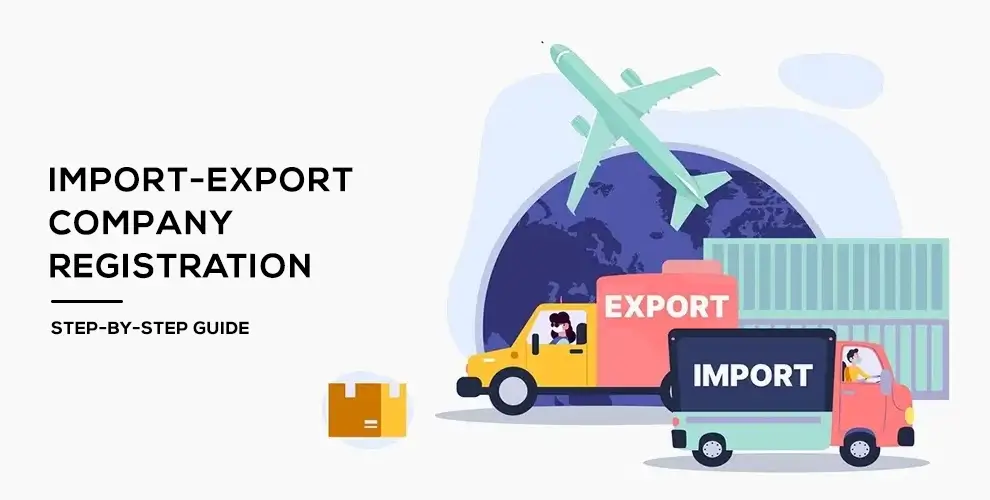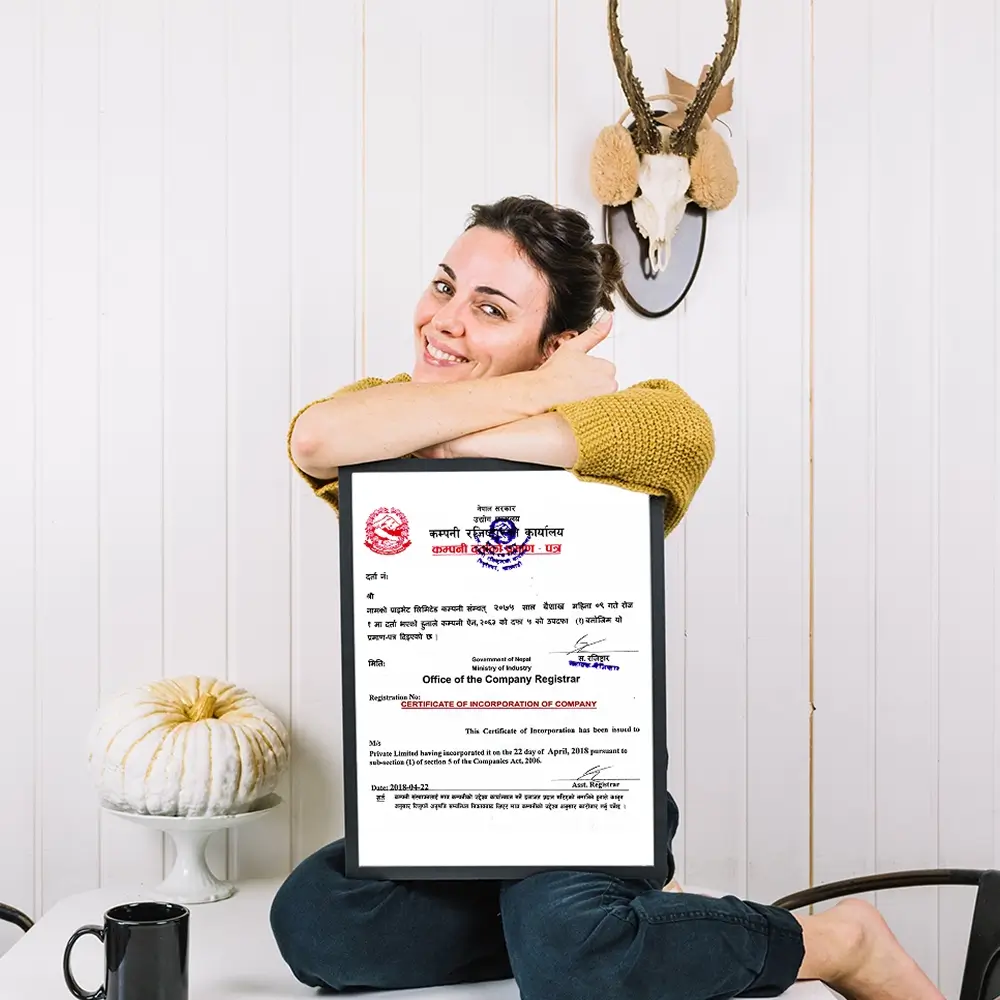Starting an import-export business in Nepal is an excellent opportunity to connect with global markets and scale your operations. Whether you plan to import goods into Nepal or export Nepali products internationally, the first step is to legally register your company.
In this guide, you’ll learn how to register an import-export company in Nepal from choosing the right structure to obtaining the EXIM Code.

5 Steps to Register an Import-Export Company in Nepal
- Step 1: Choose the Right Company Structure
- Step 2: Register Your Company at OCR (Office of the Company Registrar)
- Step 3: Register for PAN and VAT at IRD
- Step 4: Open a Bank Account
- Step 5: Apply for the Import-Export (EXIM) Code
Step 1: Choose the Right Company Structure
Before registering your business, you need to choose the type of company structure. The most common options in Nepal are:
- Private Limited Company (Pvt. Ltd.)
- Sole Proprietorship
For import-export businesses, most entrepreneurs prefer a Private Limited Company as it offers better credibility, legal protection, and ease of operation.
Step 2: Register Your Company at OCR (Office of the Company Registrar)
Once you’ve decided on the structure, the next step is to register your company.
Documents Required:
- Proposed company name (check availability at OCR portal)
- Memorandum of Association (MOA)
- Articles of Association (AOA)
- Copies of citizenship certificates of all shareholders and directors
- Passport-sized photos of shareholders/directors
- Details of the registered office address
Registration Process:
- Name reservation at OCR (online)
- Submission of documents (either online or at the OCR office)
- Payment of company registration fee
- Receive the company registration certificate
Read the Full Guide: How to Register a Company in Nepal
✅ Once registered, your company becomes a legal entity and can open a bank account, sign contracts, and start operations.
Step 3: Register for PAN and VAT at IRD
Once your company is registered, the next step is to get a Permanent Account Number (PAN) and register for VAT.
Documents Required:
- Company registration certificate
- MOA & AOA
- Office lease agreement
- Director’s citizenship copy
- Passport-size photo of the director
➡️ Visit the Inland Revenue Department (IRD) office to complete the process.
Step 4: Open a Bank Account
You need a commercial bank account in the company’s name for handling international transactions. Choose a bank that provides:
- Letter of Credit (LC) services
- Foreign currency exchange
- SWIFT payment facilities
- Trade finance support
Required documents:
- Company Registration Certificate
- PAN/VAT Certificate
- Board resolution to open the account
- Identity documents of directors/shareholders
Step 5: Apply for the Import-Export (EXIM) Code
To legally import or export goods, your company must obtain an Import-Export Code (EXIM Code) from the Department of Customs, Nepal. This is the most important step for importers/exporters.
Documents Required:
- Application form
- Company Registration Certificate
- PAN/VAT Certificate
- Bank Guarantee (NPR 300,000)
- Tax Clearance Certificate (latest)
Read the Full Guide: How to Register EXIM Code in Nepal
📌 Once approved, you will receive an EXIM Code, which allows you to legally import or export goods from Nepal.
Need Help? Get Expert Guidance
Avoid delays and rejections. Let Mr. Dipendra Shah (10+ years experience) guide you.
WhatsApp / Call: +977 9851 253 180
Frequently Asked Questions (FAQs)
How long does it take to register an import-export company in Nepal?
If all documents are ready, the process usually takes:
- Company registration: 3–5 working days
- PAN/VAT registration: 1–2 days
- EXIM Code issuance: 3–7 working days
Delays can happen due to missing documents or compliance issues, so it’s best to consult with experts.
Is EXIM Code mandatory for every import-export business?
Yes. If your company plans to engage in international trade, the Import-Export (EXIM) Code is mandatory. Without it, you cannot legally import or export goods from Nepal.
What happens if I import/export without an EXIM Code?
Operating without a valid EXIM Code is illegal in Nepal. Goods may be seized at customs, and you may face penalties, fines, or even business suspension.
Do I need a separate license for each product I import or export?
It depends on the product category. Some items like agricultural goods, medicines, or chemicals may require additional approvals from specific government departments (e.g., Department of Agriculture, Department of Drug Administration).
What is a bank guarantee for EXIM code in Nepal?
A bank guarantee is a security deposit provided to the Department of Customs when applying for an EXIM Code. The amount depends on the nature of goods. It ensures that you follow proper customs procedures and tax obligations.
Can I convert my existing company into an import-export business?
Yes. If your company is already registered, you can update the objectives in your Memorandum of Association (MOA) and apply for an EXIM Code. Company Sewa offers complete support for company updates and amendments.
How can I update or change my company objectives to include import-export activities?
You must submit an application to the Office of the Company Registrar (OCR) to amend your Memorandum of Association (MOA). After approval, you can proceed with EXIM Code application.
Company Sewa can help you update your company details smoothly.
What taxes do import-export companies in Nepal have to pay?
Some of the common taxes include:
- Customs duties on imported goods
- VAT (13%) on applicable transactions
- Income tax on profits
- TDS (Tax Deducted at Source) where applicable
Always consult a tax expert to stay compliant.
What are the penalties for late renewal or non-compliance?
Failing to renew your company annually or not filing taxes on time can result in:
- Fines and penalties
- Legal notices
- Blacklisting by government authorities
- Suspension of import-export rights
Stay compliant with OCR and Inland Revenue Department deadlines.
Why should I use a professional service to register my import-export company?
A professional agency like Company Sewa ensures:
- Accurate documentation
- Timely registration
- Avoidance of legal issues
- Help with PAN, VAT, EXIM, and bank setup
- Peace of mind so you can focus on your business

